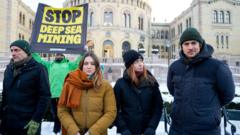Norway has announced a pause on its contentious project aimed at initiating commercial-scale deep-sea mining in its waters. This plan, which sought to open up 280,000 square kilometers (over 108,000 square miles) of seabed to mining for precious metals, faced significant opposition domestically and internationally. Key stakeholders, including the Socialist Left Party, voiced strong objections and insisted that the government withdraw its first licensing round scheduled for 2025, threatening to withhold their budgetary support otherwise.
Scientists and environmental advocates warned that such mining endeavors could have devastating ramifications for marine ecosystems. Opposition to the plan has been potent, with 32 countries, including France, Brazil, Canada, and Germany, expressing their discontent. Prime Minister Jonas Gahr Stoer characterized the recent decision as a "postponement," emphasizing that preparations for environmental regulations and assessments will proceed during this hiatus.
Haldis Tjeldflaat Helle from Greenpeace Norway celebrated the deferment as a significant triumph, stating it is contradictory for Norway to position itself as a leader in ocean conservation while supporting potentially destructive practices in its own maritime territories. The energy ministry of Norway has yet to provide an official comment on the development.
This deep-sea initiative was launched in January, aiming to position Norway at the forefront of commercial deep-sea mining—a sector that is becoming vital for the extraction of clean technology minerals like lithium and cobalt, which are predominantly sourced from a handful of countries, raising supply chain vulnerabilities.
The pushback gained momentum as European countries called for a temporary moratorium on seabed mining due to apprehensions about its detrimental impacts on marine biodiversity and climate. Golden opportunities for economic growth juxtaposed with mounting environmental risks have heightened tensions over this issue. Research from Norway’s Institute of Marine Research indicated that an additional five to ten years of ecological studies are necessary before proceeding with such plans.
The World Wide Fund for Nature (WWF) Norway has taken a bold step by suing the government to protest the project. Meanwhile, affected Norwegian seabed mineral startups, including Green Minerals, have indicated that they may face delays of up to a year as a direct result of this suspension. The unfolding situation underscores the precarious balance between resource development and environmental preservation, spotlighting the challenges faced by nations at the crossroads of industry and ecology.



















